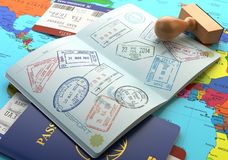The new visa waiver program for Europe’s Schengen Area will be arriving later than expected. The latest announcement from the European Union (EU) has stated that the ETIAS system will now be launched in 2025 instead of 2024. The European Travel Information and Authorisation System (ETIAS) has been in the works for several years. It
Visa Policy for Slovenia
The visa policy of Slovenia establishes the requirements and travel restrictions for every nationality around the world, and whether visitors need a visa, an online authorization, or only a passport to gain entry.
Slovenian visa law differs not only by the nationality of the visitor, but also by the reason of the visit and the expected period of stay.
As it is a member of the European Union and has signed the Schengen Agreement for passport-free travel, Slovenia shares the same visa policy as the other 25 Schengen countries.
Therefore, all Schengen zone citizens are able to gain freedom of movement to Slovenia without a passport or a visa, simply by presenting a valid ID card at an immigration checkpoint.
A number of other visa-exempt countries may gain entry to Slovenia by furnishing a valid passport upon arrival, for a stay up to 90 days for tourism, business, or transit purposes.
However, an additional requirement for visa-free visitors to Slovenia outside the Schengen zone will become mandatory from 2025: the ETIAS electronic travel authorization.
This online visa waiver program is being implemented by the European Commission in order to pre-screen those who can travel visa-free to Slovenia, in order to strengthen the external borders of the entire Schengen Area.
Holders of an approved Slovenian ETIAS will be able to travel to the Schengen Area for multiple short stays, up to 90 days with each entry, during its 3-year validity. Check the boxes below to find more information about this electronic authorization for Slovenia.
All other foreign citizens, as well as visa-exempt citizens who wish to stay for longer consecutive periods or other purposes, need an embassy visa for Slovenia. This needs to be obtained from the nearest Slovenian overseas diplomatic mission in advance of travel.
Further familiarize yourself with the visa policy of Slovenia by browsing the comprehensive information below.



